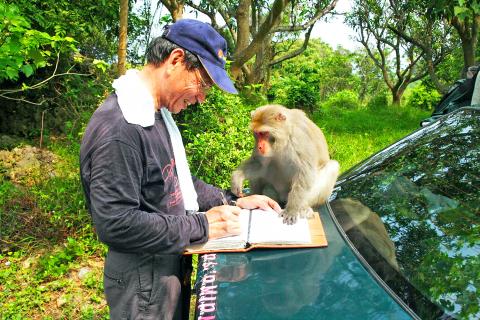Following the repeated petitions of farmers, the Council of Agriculture (COA) last week announced that protected Formosan macaques damaging crops may be destroyed by “humane methods.”
However, the policy drew criticism, as some farmers said they did not understand what methods of extermination were included under the criteria.
There is no standard definition of “humane methods,” former Taitung County Agriculture Bureau director Wu Ching-jung (吳慶榮) said.

Photo: Huang Hsu-lei, Taipei Times
“Farmers can only make their own interpretation by killing macaques as quickly and painlessly as possible,” Wu said.
Taitung County’s Yanping Township (延平) official Hu Wu-jen (胡武仁) defined the criteria as “killed by one clean shot.”
However, COA Forestry Bureau division Director Kuan Li-hao (管立豪) said he doubted the efficiency of this method at suppressing activity of the rising population of macaques in the area’s surrounding mountain farms.
Under the Wildlife Conservation Act (野生動物保育法), only farmers whose crops, poultry or livestock are damaged by protected wildlife are allowed to destroy animals after they inform local governments of their plans and receive approval.
“Farmers must have legal guns to shoot pests, but it is impossible for a farmer to own a legal gun under normal circumstances,” Kuan said.
The Formosan macaque — also known as the Formosan rock monkey — a species indigenous to Taiwan, once faced extinction from overhunting before the wildlife protection act became law in 1989, at which time the macaque was listed as “precious and rare” and placed under strict protection, the COA said.
By 2009, the monkey population had surged to about 250,000, leading the council to downgrade the Formosan macaques status to “conserved.”
However, the primate has become one of the most damaging pests to agriculture over the past few years, the COA was quoted by local media outlets as saying.
In an attempt to assuage farmers’ anger, the council has proposed a three-point plan to clear monkeys from farmland which entails organizing a monkey hazard-prevention team, guiding farmers to build fences, and capturing, sterilizing and “removing” troublesome monkeys, the COA said.
The council notice issuing what has been described as a “death penalty” on monkeys which damage agriculture has drawn criticism from Animal Protection Association secretary-general Huang Ching-jung (黃清榮).
Huang said that killing the primates just because of crop losses would make the nation “an international joke.”
Lin Chin-fu (林金福), nicknamed the “father of Formosan macaques” for his long-term contribution to the understanding and conservation of the species, is also against the COA’s policy.
Criticizing the council’s method as “confusing the result for the cause,” Lin said that it is humans that are encroaching on the monkeys’ habitat.
Lin suggested mapping out certain areas where oranges could be grown that monkeys would be allowed to consume.
That way, he said, monkeys would not trespass onto farmers’ fields and damage crops.
Additional reporting by Huang Shu-li

The Mainland Affairs Council (MAC) today condemned the Chinese Communist Party (CCP) after the Czech officials confirmed that Chinese agents had surveilled Vice President Hsiao Bi-khim (蕭美琴) during her visit to Prague in March last year. Czech Military Intelligence director Petr Bartovsky yesterday said that Chinese operatives had attempted to create the conditions to carry out a demonstrative incident involving Hsiao, going as far as to plan a collision with her car. Hsiao was vice president-elect at the time. The MAC said that it has requested an explanation and demanded a public apology from Beijing. The CCP has repeatedly ignored the desires

Many Chinese spouses required to submit proof of having renounced their Chinese household registration have either completed the process or provided affidavits ahead of the June 30 deadline, the Mainland Affairs Council (MAC) said on Thursday. Of the 12,146 people required to submit the proof, 5,534 had done so as of Wednesday, MAC deputy head and spokesperson Liang Wen-chieh (梁文傑) said. Another 2,572 people who met conditions for exemption or deferral from submitting proof of deregistration — such as those with serious illnesses or injuries — have submitted affidavits instead, he said. “As long as individuals are willing to cooperate with the legal

The Ma-anshan Nuclear Power Plant’s license has expired and it cannot simply be restarted, the Executive Yuan said today, ahead of national debates on the nuclear power referendum. The No. 2 reactor at the Ma-anshan Nuclear Power Plant in Pingtung County was disconnected from the nation’s power grid and completely shut down on May 17, the day its license expired. The government would prioritize people’s safety and conduct necessary evaluations and checks if there is a need to extend the service life of the reactor, Executive Yuan spokeswoman Michelle Lee (李慧芝) told a news conference. Lee said that the referendum would read: “Do

Taiwan's Vice President Hsiao Bi-khim (蕭美琴) said Saturday that she would not be intimidated by the Chinese Communist Party (CCP), following reports that Chinese agents planned to ram her car during a visit to the Czech Republic last year. "I had a great visit to Prague & thank the Czech authorities for their hospitality & ensuring my safety," Hsiao said on social media platform X. "The CCP's unlawful activities will NOT intimidate me from voicing Taiwan's interests in the international community," she wrote. Hsiao visited the Czech Republic on March 18 last year as vice president-elect and met with Czech Senate leadership, including